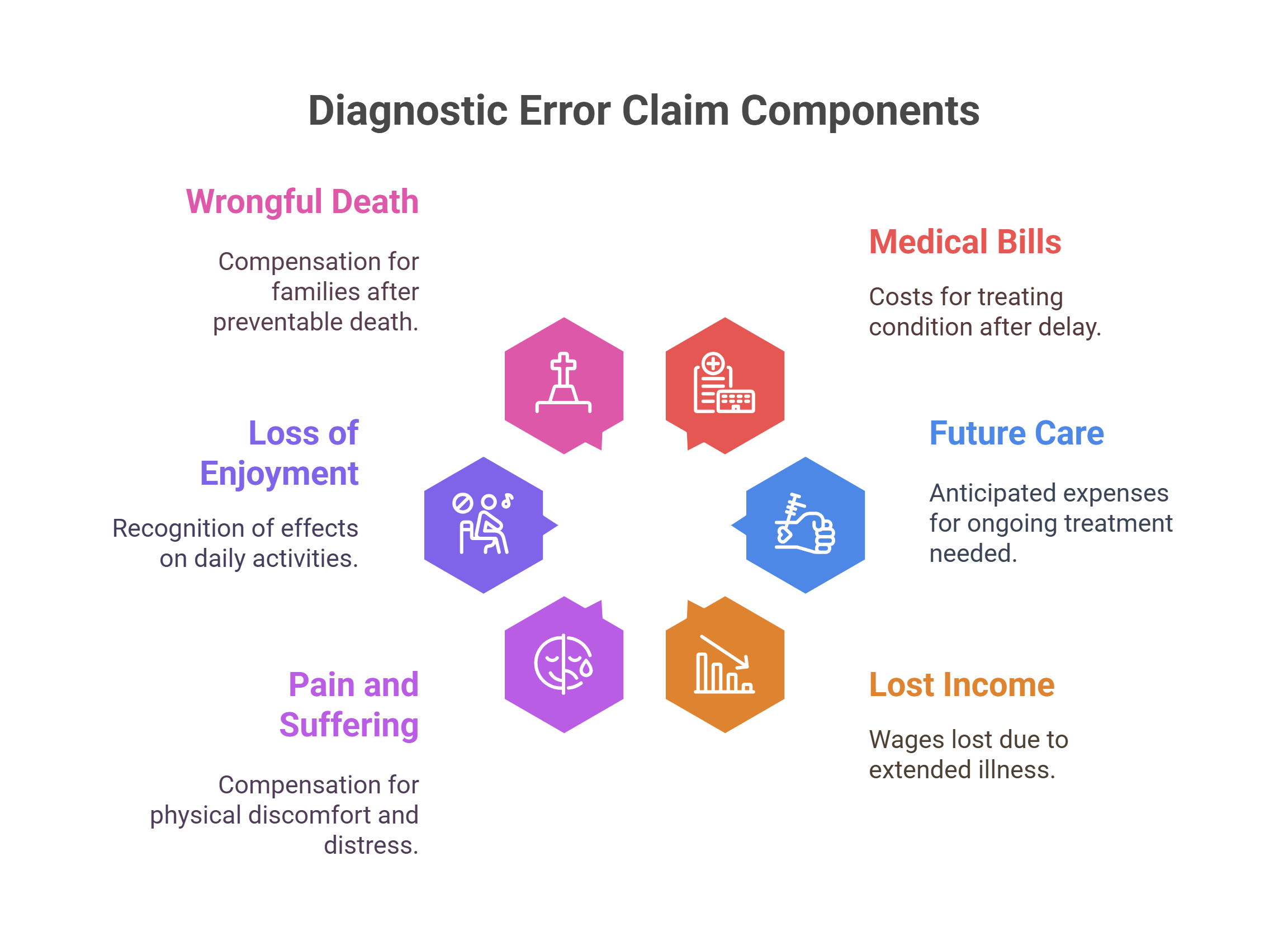When you trust a healthcare provider with your health, you expect them to listen to your concerns and investigate your symptoms properly. Unfortunately, medical professionals in Washington, D.C. sometimes fail to diagnose serious conditions, leaving patients to suffer devastating consequences. If a doctor’s failure to diagnose has harmed you or a loved one, you’re not alone in this struggle.
When healthcare providers miss critical diagnoses, patients may face unnecessary pain, advanced disease progression, reduced treatment options, or even death. These outcomes could often have been prevented with proper medical care and attention to warning signs.
Have you or a loved one been hurt by an inaccurate or delayed diagnosis? Maybe you felt brushed off by a doctor who wouldn’t listen, or left feeling like no one cared. If that sounds familiar, you’re not alone.
Frank Spector serves as an experienced Washington D.C. failure to diagnose lawyer, dedicated to helping patients seek justice when medical negligence causes harm. Our legal team understands the complex medical and legal issues involved in these cases and fights aggressively for the compensation you deserve.
✔️ Our firm has secured significant settlements and verdicts for medical malpractice victims:
- $1,200,000: Jury verdict in Washington, DC, for a misdiagnosis of stroke
- $1,000,000: Policy limit settlement in Harford County in a failure to diagnose case
- $1,000,000: Awarded a $1 million settlement for cancer misdiagnosis in Baltimore City
Contact Frank Spector at 443-845-1456 or via our online form, for a free consultation to discuss your failure to diagnose case today – when you call, you will speak to Frank personally.
How to know if you have a failure to diagnose case in Washington, D.C.
Several key factors indicate whether you may have grounds for a failure to diagnose claim in the District of Columbia. Understanding these elements helps determine if medical negligence contributed to your worsened condition.
- You had an ongoing provider-patient relationship: A documented relationship with the healthcare provider establishes their duty to provide competent care.
- Your doctor failed to investigate symptoms or order tests: Healthcare professionals must properly evaluate concerning symptoms through appropriate testing and examination.
- You were later diagnosed with a serious condition: A subsequent diagnosis reveals what the original provider should have discovered.
- Earlier detection could have improved your outcome: Medical evidence shows that timely diagnosis would have led to better treatment results.
- Your condition worsened significantly due to delay: The diagnostic error directly contributed to the progression of your illness or injury.
✔️ We use these elements to prove that medical negligence occurred and that it directly harmed your health and well-being.
What compensation can you claim?
Victims of diagnostic errors in Washington, D.C., may be entitled to various forms of compensation for the harm they’ve suffered. Understanding these potential damages helps patients make informed decisions about pursuing legal action.
In a failure to diagnose case, compensation typically includes both economic damages (like medical bills and lost income) and non-economic damages (such as pain and suffering):
- Medical bills for delayed or advanced treatment: All costs related to treating your condition after the diagnostic delay, including hospitalization and procedures.
- Future care costs: Anticipated medical expenses for ongoing treatment that wouldn’t have been necessary with proper initial diagnosis.
- Lost income and earning capacity: Wages lost due to extended illness and reduced ability to work in the future.
- Pain and suffering: Compensation for physical discomfort and emotional distress caused by the diagnostic error.
- Loss of enjoyment of life: Recognition of how the delayed diagnosis has affected your daily activities and quality of life.
- Wrongful death benefits (if fatal): Compensation for families when diagnostic errors result in preventable death.

How to get in touch with our Washington D.C. delayed diagnosis lawyer
Multiple convenient options are available for contacting our legal team about your potential failure to diagnose case. We make it easy for clients to reach us during this difficult time.
When you reach out, you won’t be passed off to staff—Frank will speak with you directly to personally review your concerns and explain your legal options.
- Call us: Reach Frank directly at 443-845-1456 for personal assistance with your case.
- Message us online: Use our secure contact form to request your consultation at a time that works for you.
- Email our office: Share your case details by emailing frank@frankspectorlaw.com, and we’ll respond promptly.
⚠️ Don’t wait to seek legal help – time limits apply to medical malpractice claims in D.C.
Our Washington D.C. medical malpractice lawyer offers a free consultation to evaluate your diagnostic error case.
Who can be held accountable in a failure to diagnose claim?
Multiple parties may bear responsibility when diagnostic errors occur in Washington, D.C., healthcare settings. Identifying all potentially liable parties is essential for maximizing compensation in your case.
- Primary care physicians often serve as the first point of contact for patients with concerning symptoms. When these doctors fail to investigate complaints properly or dismiss serious warning signs, they may be liable for resulting harm. Family practitioners, internists, and other primary care providers have a duty to recognize when symptoms warrant further investigation.
- Emergency room physicians face particular scrutiny in failure to diagnose cases. ER doctors must quickly assess potentially life-threatening conditions and make critical decisions under pressure. When they miss heart attacks, strokes, or other emergencies, the consequences can be fatal.
- Radiologists who misread imaging studies or fail to identify abnormalities on X-rays, CT scans, or MRIs may also face liability. These specialists play a key role in the diagnostic process, and their errors can lead to delayed treatment.
- Hospital systems themselves can be held accountable when institutional policies or practices contribute to diagnostic failures. Understaffing, inadequate protocols, or poor communication systems may create conditions that increase the risk of missed diagnoses.
- Laboratory personnel and specialists who ignore test results or fail to communicate critical findings appropriately may also share responsibility for diagnostic errors that harm patients.

How our Washington D.C. failure to diagnose lawyer can help
Our experienced legal team provides comprehensive support throughout every stage of your failure to diagnose case. We understand the complex medical and legal issues involved and work diligently to build the strongest possible claim.
- Review your case timeline: We gather medical records and pinpoint exactly when and how healthcare providers failed to act appropriately.
- Consult medical experts: Independent physicians help confirm whether proper diagnostic steps were taken according to accepted medical standards.
- Identify all responsible parties: We investigate whether hospitals, doctors, laboratories, or other providers may share fault for your diagnostic delay.
- Negotiate aggressively: Our team pushes back against lowball insurance settlement offers and fights for fair compensation.
- File your claim on time: We manage all legal deadlines and paperwork requirements so you don’t miss your opportunity for justice.
📌 Our comprehensive approach ensures no stone is left unturned in building your case and seeking maximum compensation.
Why choose Frank Spector Law as your Washington D.C. failure to diagnose attorney?
Frank Spector brings 30 years of medical malpractice experience to every case, with a proven track record of success in complex diagnostic error claims. Our client-centered approach means you receive personalized attention throughout the legal process, not just another case number.
Our firm maintains a strong presence in the Washington D.C. area, with deep knowledge of local courts, medical institutions, and legal procedures. This experience gives us valuable insights into how to effectively present failure-to-diagnose cases in the District of Columbia.
We operate on a contingency fee basis, meaning you pay no attorney fees unless we win your case. This no-risk arrangement allows you to pursue justice without worrying about upfront legal costs during an already difficult time.
⚖️ Frank Spector’s professional recognition includes multiple prestigious accolades that demonstrate our commitment to excellence in medical malpractice representation.
Our credentials include:
- “Superb” rating on Avvo
- Selected to Super Lawyers: 2008 – 2021
- Verified Justia profile
- Verified D.C. Bar member: 1993 – current
Not ready to call? Fill out our secure online contact form and Frank will personally review your case and get in touch to discuss your legal options—your path to answers starts here.
Statute of limitations in Washington, D.C.
Time limits for filing medical malpractice lawsuits in Washington D.C., are strictly enforced by the courts.
Under D.C. Code § 12–301(8), medical malpractice claims must generally be filed within three years from the date the negligence occurred or was reasonably discovered. However, the discovery rule allows this timeline to be extended in cases where the harm, such as from a delayed or missed diagnosis, is not immediately apparent.
For children, D.C. Code § 12–302(a)(1) extends the statute of limitations until the child’s 21st birthday, recognizing that birth-related or early childhood injuries may take years to identify.
⚠️ Don’t wait to consult with our attorney – delays in seeking legal help can weaken your case by making evidence harder to gather and witnesses more difficult to locate.

General information on failed diagnoses
Diagnostic errors represent a significant problem in healthcare systems nationwide, affecting millions of patients each year. Understanding the scope and nature of these failures helps patients recognize when they may have been victims of medical negligence.
The healthcare system’s complexity creates multiple opportunities for diagnostic mistakes to occur. From initial patient consultations through laboratory testing and specialist referrals, each step in the diagnostic process presents potential points of failure that can lead to missed or delayed diagnoses.
💡A 2023 study published in BMJ Quality & Safety found that diagnostic errors contribute to nearly 800,000 deaths or permanent disabilities in the U.S. each year, making it one of the most serious and harmful forms of medical malpractice.
What is considered failure to diagnose?
Failure to diagnose occurs when healthcare providers completely miss a medical condition despite having sufficient information to make the correct diagnosis. This differs from misdiagnosis, where doctors reach an incorrect conclusion, and delayed diagnosis, where the correct diagnosis is eventually made but too late to prevent harm.
Medical professionals have a duty to investigate patient symptoms appropriately and consider all reasonable diagnostic possibilities. When they fail to order necessary tests, ignore obvious warning signs, or dismiss patient concerns without proper evaluation, they may be liable for failure to diagnose.
The legal standard focuses on whether a reasonably competent physician with similar training would have made the correct diagnosis under the same circumstances. If medical experts conclude that proper care would have led to a timely diagnosis, the healthcare provider may be found negligent.

Common conditions providers fail to diagnose
- Cancer (breast, colon, lung, prostate): Early-stage cancers may present with subtle symptoms that providers sometimes attribute to benign conditions.
- Stroke: Symptoms can be mistaken for migraines or other neurological issues, especially in younger patients or those with atypical signs.
- Heart attack: Cardiac events are often misdiagnosed as indigestion, anxiety, or musculoskeletal pain, particularly in women and younger adults.
- Sepsis/infection: This rapidly progressing, life-threatening condition may be misread as a minor illness, delaying urgent care.
- Aneurysms: These dangerous blood vessel abnormalities can remain undetected until rupture, especially if headaches or fatigue are misinterpreted.
- Diabetes complications: Providers may overlook signs of nerve damage, kidney failure, or infections, mistaking them for unrelated issues.
- Meningitis: Often confused with viral infections or flu, especially in children, leading to delays in critical antibiotic treatment.
⚠️ Diagnostic error examples: tests missed and consequences
| Condition | Missed or Delayed Test | Potential Complication |
|---|---|---|
| Lung cancer | Chest X-ray or CT scan | Metastasis (spread to other organs) |
| Stroke | Brain MRI or CT scan | Paralysis, cognitive impairment |
| Sepsis | Blood cultures, CBC | Septic shock, organ failure |
| Heart attack | EKG, troponin levels | Heart failure, death |
| Aneurysm | CT angiography, ultrasound | Sudden rupture, fatal hemorrhage |
| Meningitis | Lumbar puncture, blood tests | Brain damage, death |
| Diabetic infection | Blood sugar panel, urinalysis | Amputation, kidney failure |
Examples of diagnostic negligence
Healthcare providers can fail their patients in numerous ways during the diagnostic process. Recognizing these common forms of negligence can help determine when medical malpractice may have occurred:
- Failing to order labs or imaging: When symptoms clearly warrant further investigation through blood tests or diagnostic scans.
- Misreading test results: Incorrectly interpreting lab values, X-rays, MRIs, or other studies that could have revealed serious conditions.
- Ignoring symptoms or red flags: Dismissing patient complaints or failing to evaluate obvious warning signs.
- Failing to refer to a specialist: Not consulting with experts when a patient’s condition requires advanced or specialized care.
- Poor provider communication: Inadequate information sharing between doctors, nurses, and other care team members.
- Not following up on abnormal findings: Overlooking or failing to act on concerning test results or changes in a patient’s condition.
Signs a delayed diagnosis caused harm
Determining whether diagnostic delays caused actual harm requires careful evaluation of your medical timeline and outcomes. Several indicators suggest that earlier diagnosis could have prevented or minimized your suffering.
- Complications that developed after the delayed diagnosis may have been preventable with prompt treatment. For example, cancer that spreads to other organs or infections that progress to life-threatening sepsis might have been stopped with earlier intervention.
- Preventable surgeries or more invasive treatments may indicate diagnostic harm. When patients require extensive procedures that could have been avoided with timely diagnosis, this suggests that the delay caused additional injury.
- Loss of treatment windows represents another sign of harm from diagnostic delays. Many conditions have optimal treatment periods, and missing these opportunities can significantly worsen patient outcomes and prognosis.
- Progression to the terminal stages of disease often indicates that diagnostic delays prevented curative treatment options. When conditions advance beyond treatable stages due to late diagnosis, patients may face shortened life expectancy or reduced quality of life.
Free consultation: Speak with our failure to diagnose attorney in Washington, D.C., today
Don’t let medical negligence go unaddressed when it has caused you or your family serious harm. Frank Spector Law provides experienced representation for Washington D.C. residents who have suffered from failure to diagnose cases.
Our team understands the devastating impact that diagnostic errors can have on patients and families. We’re committed to fighting for the compensation you deserve while holding negligent healthcare providers accountable for their mistakes.
Time is critical in medical malpractice cases due to strict legal deadlines and the need to preserve evidence. Don’t wait to seek legal help when your health and financial future are at stake.
Call Frank Spector at 443-845-1456 or fill out our secure contact form for a free consultation with our medical malpractice attorneys—when you reach out, you’ll speak directly with Frank.

FAQs
Can I sue for failure to diagnose cancer?
Yes, you can file a lawsuit if healthcare providers failed to diagnose your cancer despite clear symptoms or test results that should have prompted further investigation. Cancer misdiagnosis cases require proving that earlier detection would have improved your treatment options and outcomes. Our attorneys work with oncology experts to evaluate these complex cases.
What's the difference between delayed diagnosis and misdiagnosis?
Delayed diagnosis occurs when healthcare providers eventually reach the correct diagnosis, but too late to prevent harm, while misdiagnosis involves reaching an incorrect conclusion about your condition. Both can constitute malpractice if they result from provider negligence and cause measurable harm to your health or treatment prospects.
Can I bring a case if my loved one died before being diagnosed?
Yes, families can pursue wrongful death claims when diagnostic failures contribute to a patient's death. These cases require proving that timely diagnosis and treatment could have prevented or delayed the death. Surviving family members may recover compensation for medical expenses, lost income, and the pain of losing their loved one.
Can I bring a case if my loved one died before being diagnosed?
Bring all medical records related to your care, including test results, hospital discharge summaries, and physician notes. Also, provide a timeline of your symptoms and medical visits, insurance information, and documentation of financial losses. Any correspondence with healthcare providers about your condition can also be helpful for case evaluation.
